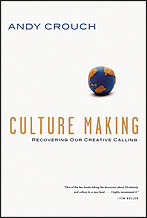By Mariah Secrest
My encounter with the book Culture Making was my first exposure to Andy Crouch, but if authors can have groupies then I think Im about to be one of his. The recent releases own reference to being a stirring manifesto is hardly too high an estimation of itself.
 Falling under the collaboration of Gabe Lyons Fermi Project, Culture Making is an expose that takes seriously the responsibility to replace complaining about culture with doing something about culture. But the book is more than that.
Falling under the collaboration of Gabe Lyons Fermi Project, Culture Making is an expose that takes seriously the responsibility to replace complaining about culture with doing something about culture. But the book is more than that.
Having a deeply intellectual background (he earned his bachelors from Cornell, his masters from Boston University School of Theology, and served on InterVarsity staff at Harvard), Andy Crouch authoritatively surveys a macro-scale analysis not only of the culture(s) we are presently part of but also of the nature of culture itself.
Culture obviously doesnt happen in a vacuum, so he encourages us to ask particularly revealing questions about cultural artifacts.
These questions probe into the assumptions of any cultural artifact about the way the world is and ought to be, about possibilities and impossibilities, and about resulting cultural effects dependent upon that artifacts creation.
I appreciate the academic approach, but he weds this macro-analysis ever so closely with micro-examples from within our spheres of culture. After laying this foundation of the workings of culture (which he loosely defines as what we make of the world around us), he goes on to highlight what this means for believers.
He traces the American Christian communitys own historical sequence of responses to the world around them, moving around among the various reactions of condemning, critiquing, consuming, and copying. While each of these are, at times, natural and even appropriate gestures, he warns us about falling passively into any default postures towards culture.
Crouch then suggests that we search Scripture to learn the heart of our Creator God towards participating in and shaping culture. He not only pulls anecdotal examples of biblical characters reacting to culture, but also considers a contextual continuum of the Bible as a whole as a guiding point for determining our place within the world and our impact on it.
Finally, he moves into considering the actual work of culture making, including such issues as the realistic depth and breadth of our culture making impact as well as our God-given propensity and capacity for it. He also suggests some insightful tools for embarking on cultural, good-producing ventures.
My favorite thing about this book is the way Crouch fluidly travels from comprehensive birds-eye perspective to the minutest, most tangible instance of culture and all without losing any of the lucidity of its surrounding context. He has an uncanny ability to connect the dots of the story of humanity, which I suppose is the ultimate example for us of the very thing he advocates: doing our best to make sense of the world around us.
If you liked this article, check out: unChristian: An Interview with the Authors
 Mariah has currently landed herself in Tucson, Arizona, where she just finished a philosophy degree from the University of Arizona. She enjoys writing almost as much as she enjoys making music. Almost. You can visit her on Myspace.
Mariah has currently landed herself in Tucson, Arizona, where she just finished a philosophy degree from the University of Arizona. She enjoys writing almost as much as she enjoys making music. Almost. You can visit her on Myspace.
